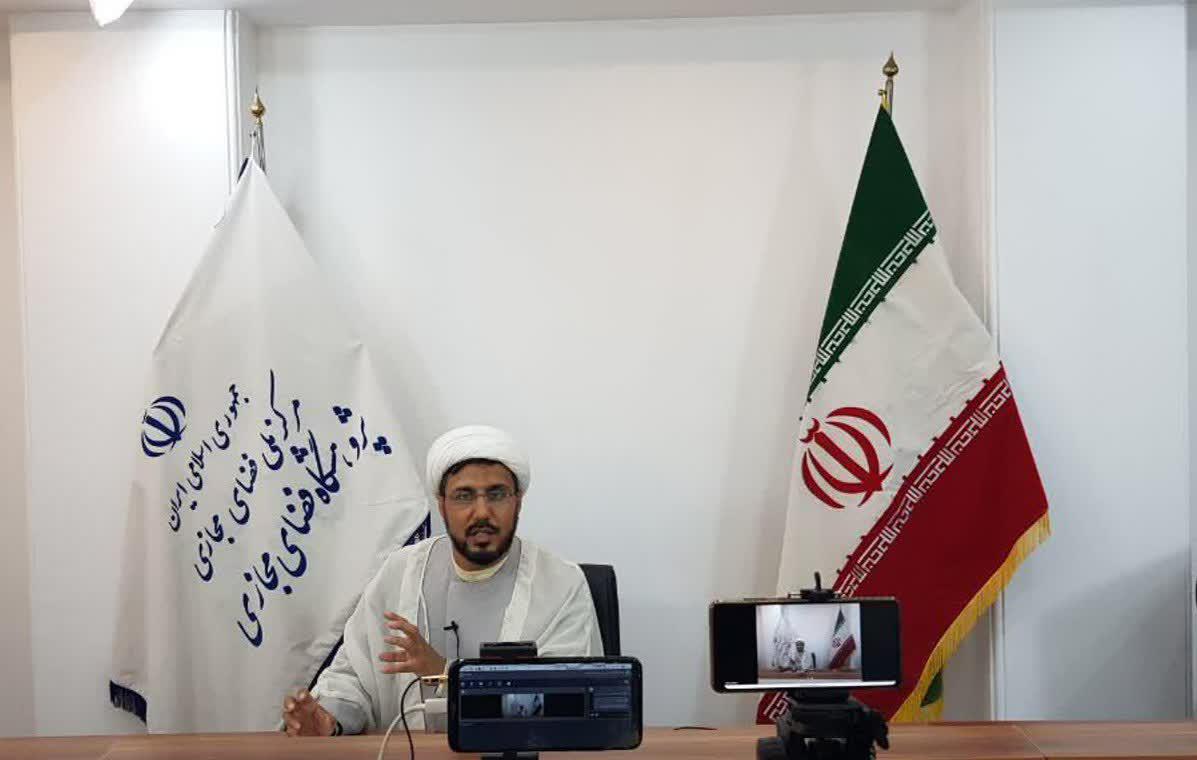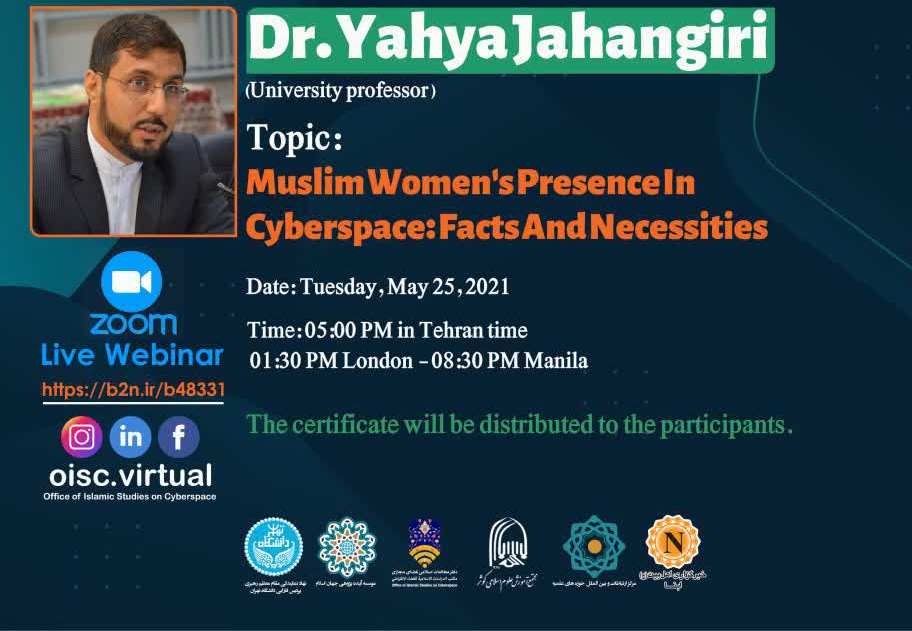- صفحه اصلی
- درباره همایش
- کمیته های علمی
- برگزارکنندگان و حامیان
- فراخوان ها
- فراخوان علمی همایش
- فراخوان کنگره شعر
- اخبار و گزارش ها
- اخبار همایش
- پیش نشست های علمی
- همایش سه روزه
- برای پژوهشگران
- درباره حضرت ابوطالب
- تراث ابوطالب
- شیوه نامه تألیف مقالات
- شعر و ادب
- نوحه
- چند رسانه ای
- دانلود پوستر و بروشور
- گالری تصاویر
- دانلود ویژه نامه ها
- ارتباط با همایش
- نشانی دبیر خانه
- ارسال مقالات
Scientific Conference “Muslim woman presence in cyberspace, assets and necessities” held in Qom
The second meeting of the series of scientific sessions “The Islamic World in the Age of Cyberspace” was held on “The presence of Muslim women in cyberspace, assets, and necessities” virtually, and in English.
The second meeting of the series of scientific sessions “The Islamic World in the Age of Cyberspace” was held on “The presence of Muslim women in cyberspace, assets, and necessities” virtually, and in English.
At the beginning of the meeting, referring to the importance of cyberspace in the present era, Hojat al-Islam Mahmoud Rafiyan, the scientific secretary of the meeting said, “Cyberspace has penetrated all areas of human life. With the widespread growth of new communication technologies, many changes have taken place in the structure of societies. Therefore, recognizing this space is essential for women and mothers who make up half of the population.”
In this webinar, Hojat al-Islam Dr. Yahya Jahangiri, professor at the seminary and university, stated, “First, we must examine how to interact with cyberspace, and explore its nature. Second, the difference between “interacting with cyberspace” or “coexisting with cyberspace” must be considered. Many experts believe that users should learn how to interact with cyberspace. While this view is not correct, and users live within cyberspace. Cyberspace is not something that is outside of our lives, and like real life, we work within it. Users, therefore, need to learn how to live in this new environment.”
Third, likening cyberspace to a tool that can be both a threat and an opportunity is an incorrect analogy. Some believe that cyberspace is like a knife, which saves human lives if held by a skilled surgeon, and if an ignorant person takes it, he commits murder. This analogy is not correct because we do not have cyberspace and its command to be able to make it obey us. Rather, we are under the control of cyberspace and we are surrounded by its domination. Cyberspace is the product of “Postmodernism” which does not try to spread the truth, but tries to spread what it determines that is truth. Cyberspace leads us to accept or deny anything that its commanders command. Postmodernism thought promotes a lifestyle in which there are no restrictions on the attainment of goals and sensual desires. Man is free to do any activity - as long as he does not endanger the freedom of another. Cyberspace also has the potential of being boundless. Users, regardless of their taste or religion. can share any content and ideas with others, without special law restricting them.

“Cyberspace users have not learned the correct information about the playground. That is, to work in cyberspace, you must first be well acquainted with the philosophy and requirements of cyberspace, then work in it. It is a mistake for some activists to confine themselves to the messengers that are active in their own country and to neglect to learn and using other tools and messengers that have a wider audience worldwide. Therefore, among the top 100 women active in cyberspace, very few of them are Muslim and Shiite,” he noted, referring to one of the harms that the activists of Women and Family Studies in cyberspace are faced with.
It should be mentioned that the scientific “The presence of Muslim women in cyberspace, assets, and necessities” was held by the Office of Islamic Studies and Theological Communications of the Cyberspace Research Institute, Deputy for Relations and International Affairs of Seminaries, Kosar Islamic Sciences Education Complex, ABNA News Agency, Islamic World Futures Research Institute, and the Representation of the Supreme Leader in Farabi Campus of the University of Tehran.
The second meeting of the series of scientific sessions “The Islamic World in the Age of Cyberspace” was held on “The presence of Muslim women in cyberspace, assets, and necessities” virtually, and in English.
The second meeting of the series of scientific sessions “The Islamic World in the Age of Cyberspace” was held on “The presence of Muslim women in cyberspace, assets, and necessities” virtually, and in English.
At the beginning of the meeting, referring to the importance of cyberspace in the present era, Hojat al-Islam Mahmoud Rafiyan, the scientific secretary of the meeting said, “Cyberspace has penetrated all areas of human life. With the widespread growth of new communication technologies, many changes have taken place in the structure of societies. Therefore, recognizing this space is essential for women and mothers who make up half of the population.”
In this webinar, Hojat al-Islam Dr. Yahya Jahangiri, professor at the seminary and university, stated, “First, we must examine how to interact with cyberspace, and explore its nature. Second, the difference between “interacting with cyberspace” or “coexisting with cyberspace” must be considered. Many experts believe that users should learn how to interact with cyberspace. While this view is not correct, and users live within cyberspace. Cyberspace is not something that is outside of our lives, and like real life, we work within it. Users, therefore, need to learn how to live in this new environment.”
Third, likening cyberspace to a tool that can be both a threat and an opportunity is an incorrect analogy. Some believe that cyberspace is like a knife, which saves human lives if held by a skilled surgeon, and if an ignorant person takes it, he commits murder. This analogy is not correct because we do not have cyberspace and its command to be able to make it obey us. Rather, we are under the control of cyberspace and we are surrounded by its domination. Cyberspace is the product of “Postmodernism” which does not try to spread the truth, but tries to spread what it determines that is truth. Cyberspace leads us to accept or deny anything that its commanders command. Postmodernism thought promotes a lifestyle in which there are no restrictions on the attainment of goals and sensual desires. Man is free to do any activity - as long as he does not endanger the freedom of another. Cyberspace also has the potential of being boundless. Users, regardless of their taste or religion. can share any content and ideas with others, without special law restricting them.

“Cyberspace users have not learned the correct information about the playground. That is, to work in cyberspace, you must first be well acquainted with the philosophy and requirements of cyberspace, then work in it. It is a mistake for some activists to confine themselves to the messengers that are active in their own country and to neglect to learn and using other tools and messengers that have a wider audience worldwide. Therefore, among the top 100 women active in cyberspace, very few of them are Muslim and Shiite,” he noted, referring to one of the harms that the activists of Women and Family Studies in cyberspace are faced with.
It should be mentioned that the scientific “The presence of Muslim women in cyberspace, assets, and necessities” was held by the Office of Islamic Studies and Theological Communications of the Cyberspace Research Institute, Deputy for Relations and International Affairs of Seminaries, Kosar Islamic Sciences Education Complex, ABNA News Agency, Islamic World Futures Research Institute, and the Representation of the Supreme Leader in Farabi Campus of the University of Tehran.




